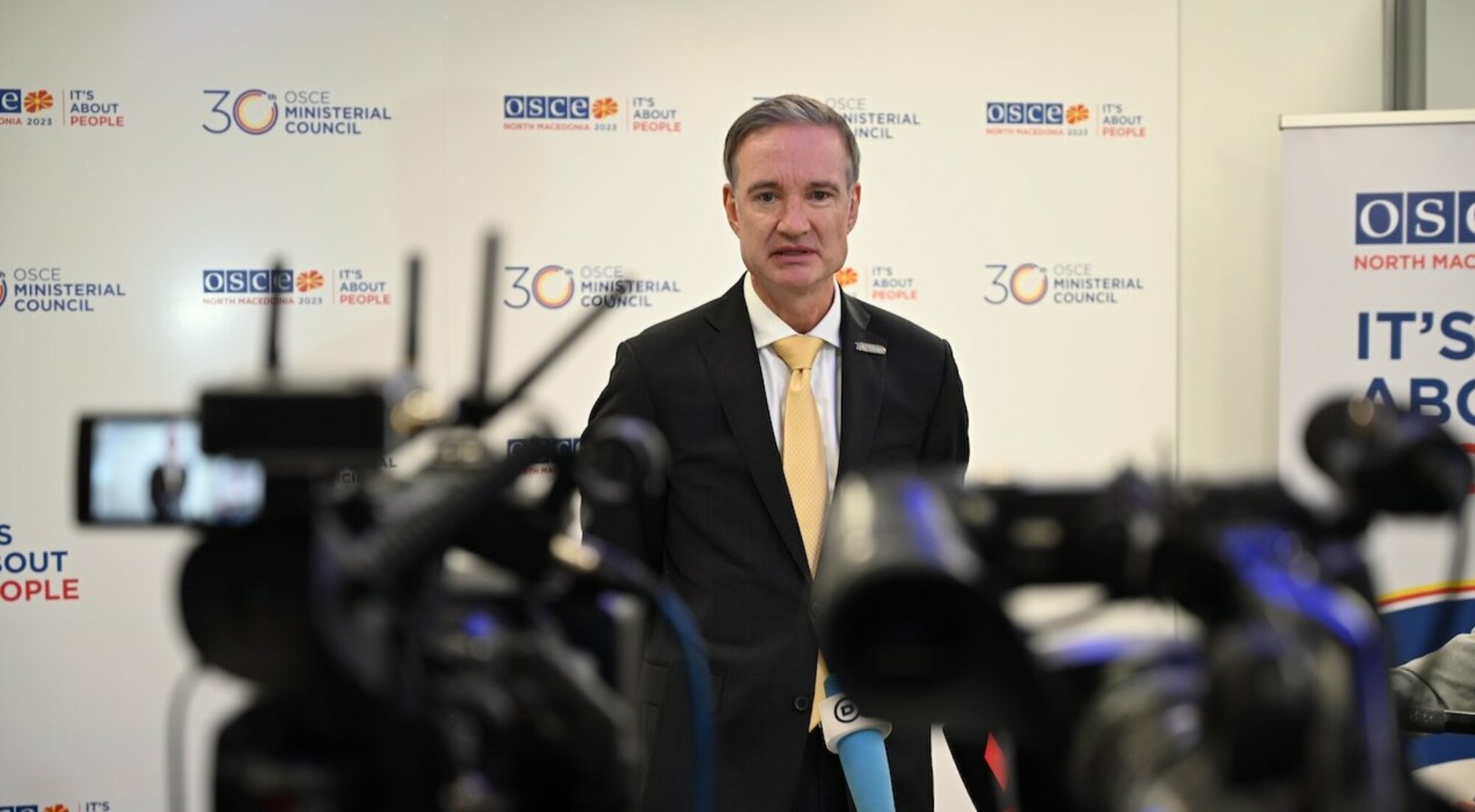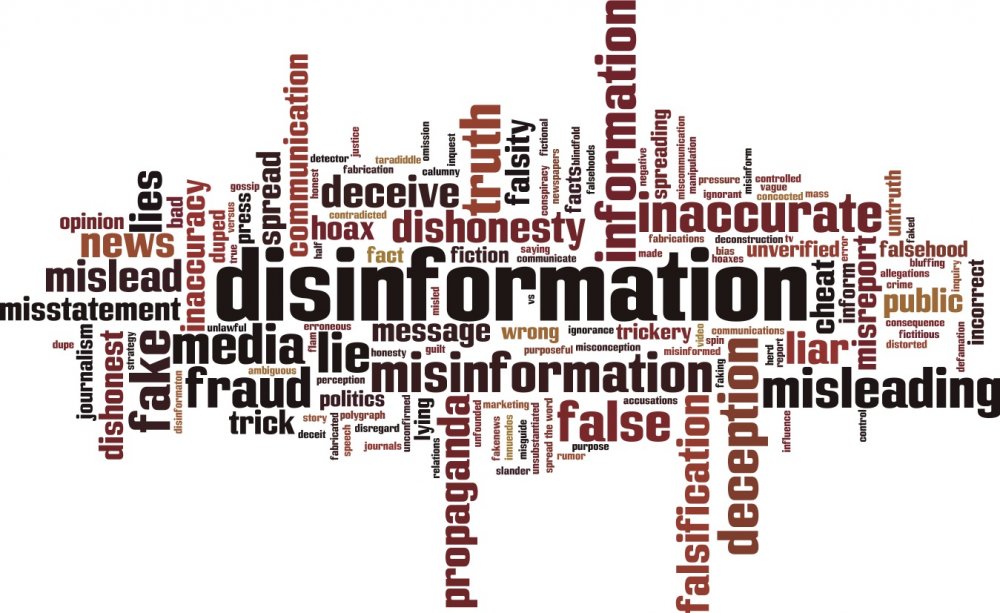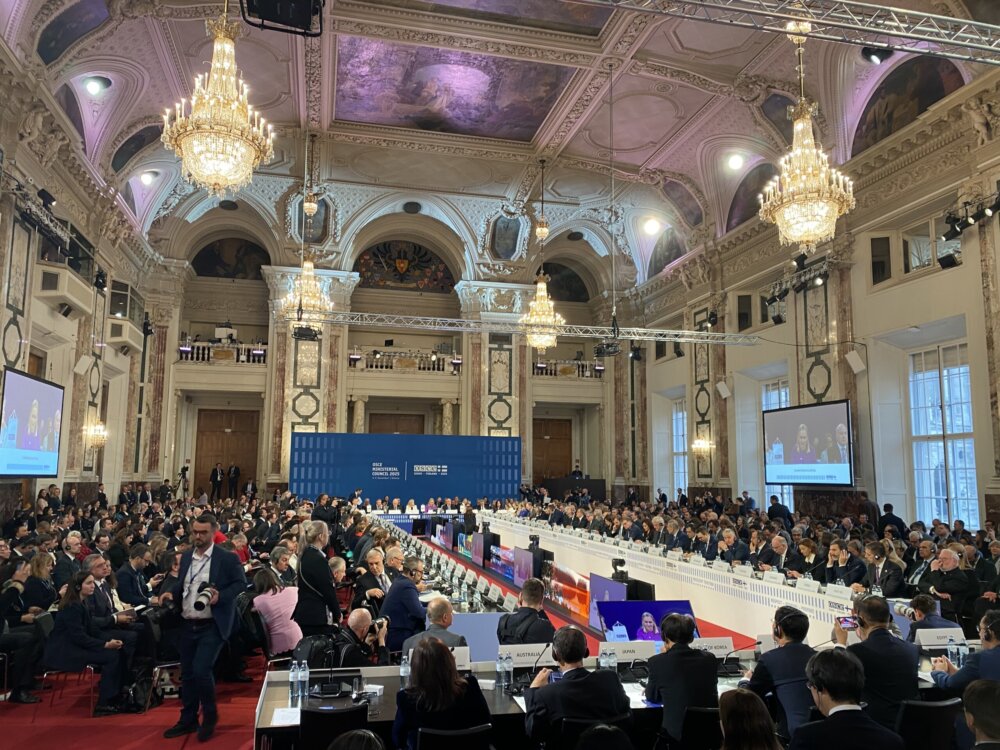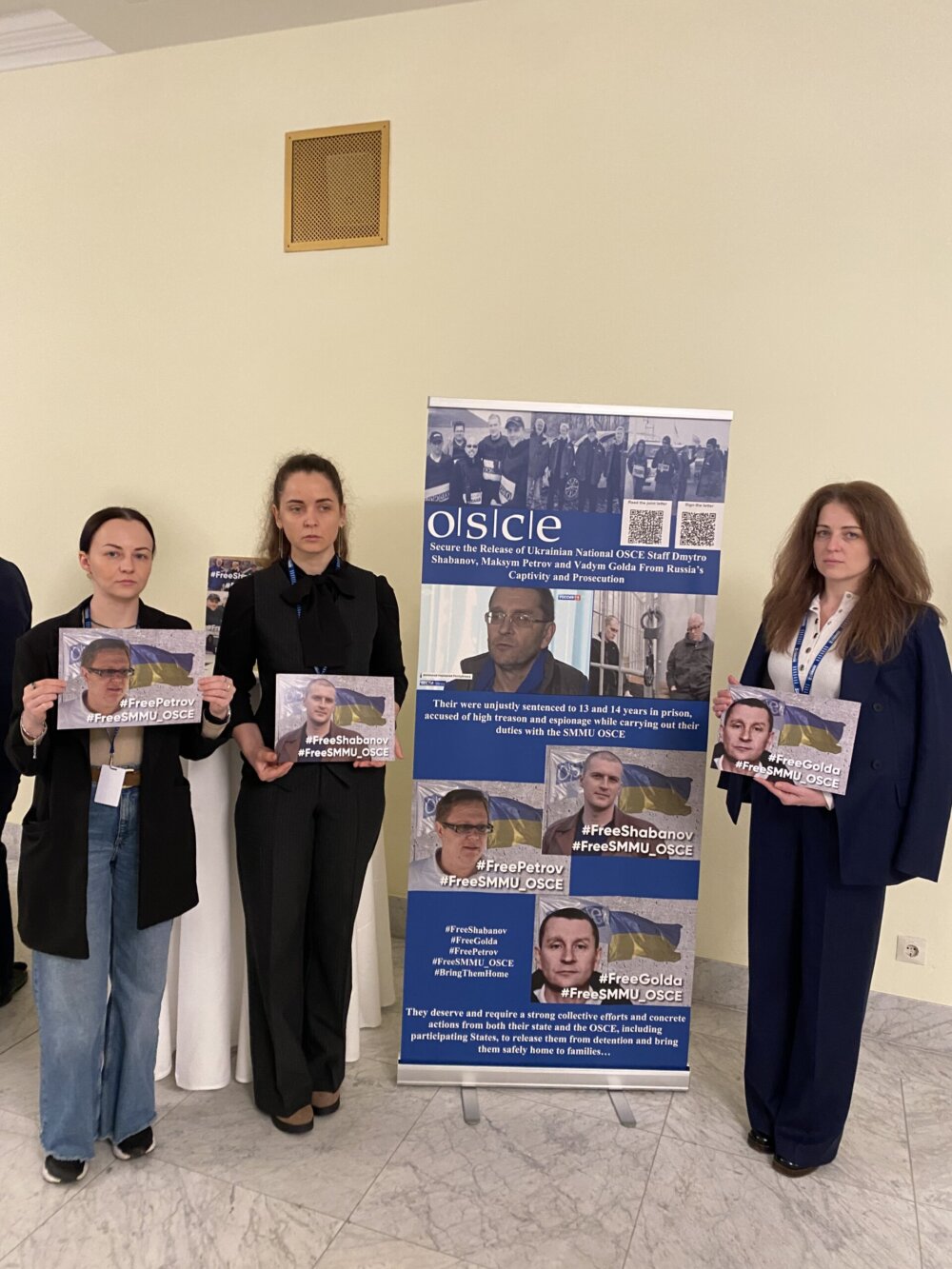U.S. Mission to the OSCE

U.S. Ambassador Michael Carpenter: OSCE should ‘unite likeminded countries’ to do ‘meaningful’ work together
SHR Monitor: Ambassador, we last sat down together for an interview two years ago, on Feb. 7, 2022, two weeks before Russia launched its full-scale war against Ukraine. At the time, you expressed great concern about the Russian troop buildup close to Ukraine’s border. We also talked about the different diplomatic initiatives that were being pursued at the time within the context of the OSCE. Yet two weeks after we spoke, Russia launched its a full-scale invasion of Ukraine, a peaceful neighbor. I would like to give you a chance to react to these dramatic changes that have occurred over the past two years.
Michael Carpenter: Before the war started, in spite of all the intelligence we had, it was difficult to fathom that the Russian Federation, which was an integrated member of the international community, could do something so outrageous and beyond the pale of civilized behavior — not just that it would undertake military hostilities against a peaceful neighbor, as you said, but that it would engage in such a widespread effort to wipe out Ukrainian identity.
It was difficult to fathom that Russia would institute a system of filtration camps where people are reportedly routinely tortured and subjected to interrogation methods of the most inhuman and barbaric type, and where a policy coming from the very top of the Kremlin would include the separation of Ukrainian children from their families. This is something that goes beyond just a military conflict. It really is civilizational in nature.
I remember thinking after our interview two years ago that we would probably see an escalation of the situation. But if I understand you correctly, at the time you did not anticipate anything on the scale of what has happened in the past two years.
We were expecting a full-scale invasion of Ukraine, and we were warning our partners and allies that this was coming. And we had some indications that Russia was preparing for some rather brutal tactics in the execution of this strategy.
But what they have done in the occupied territories they now control brings home the message that this is not just some faraway conflict over a piece of land or territory. I want to accentuate this point to your readers and to all people. It is about the Geneva Conventions, international humanitarian law, human rights. It is about the most basic principles that we live by.
If we look at the battlefield right now, it seems that Russia currently has the upper hand despite all the support the West has given to Ukraine. Where do you think this is heading? Is there a chance for a ceasefire, or do we have to prepare for even further escalation?
Unfortunately, President Putin has shown no interest in diplomacy or in de-escalation and pulling back his forces. Just the opposite. His recent statements and interviews confirm that he is intent on subjugating Ukraine and that he does not believe Ukraine has the right to exist as a state — or that there is such a thing as a Ukrainian identity.
Unfortunately, I don’t see scope for meaningful negotiations right now. We know what happens if we allow Russia to keep control of the territories that it currently occupies. It means more filtration, more torture, more abuse of human rights.
We now know about the practices because we have survivors of the brutalities. The victims have come and spoken to us in Vienna and other cities around the world and told us exactly what is going on. We should be under no illusion that if we somehow freeze this conflict now, this aspect of the war will go away.
What exactly should the West do now?
The West needs to continue to support Ukraine until Ukraine can liberate its territory. This won’t be easy. There may be a need to slightly adjust the Ukrainian strategy going forward, especially on the battlefield, but ultimately it boils down to giving Ukraine the means to liberate its people from a very brutal attempt at wiping out Ukrainian identity in those parts of the country that Russia occupies.
Do you believe that if the West does not manage to stop Putin in Ukraine, there could be further escalation beyond Ukraine?
The risk is certainly there.
And we should remember that the world is watching this moment — the largest land war in Europe since the Second World War — and is drawing conclusions from it. We need to ensure that the conclusions that are drawn are that these types of military adventures result in strategic failure. We need to prevent a situation where a dictator in some other part of the world may want to emulate this war with respect to their neighbors.
Considering the present circumstances, with the war ongoing and the OSCE blocked on almost all fronts, what could be the role of the organization in maintaining European security?
It is a challenging subject because the OSCE was created as a conference in the 1970s with the purpose of advancing cooperative security. But now we have a key player around the table that has not only no interest in cooperative security but a clear interest in undermining the security of its neighbors. In such circumstances, the instruments of the OSCE are less relevant.
However, the OSCE has grown over the years. The organization now has field missions in 13 different countries, including a Support Program in Ukraine. We have to double down on these very practical efforts to advance our values and promote security, including in Moldova, the Western Balkans and Central Asia.
We also have to support Ukrainian President Zelenskyy’s 10-point peace plan as well as the country’s aspiration for EU accession. The OSCE footprint in Ukraine is not going to be the primary supporter of EU acquis, but it can be helpful in tackling a wide range of other issues, including demining efforts, psychosocial support and promotion of the rule of law.
But do you agree that the original concept of cooperative security is of no use in the current circumstances?
No, there I disagree. I think the challenge for the OSCE right now is to find ways to unite like-minded countries that still adhere to the values and principles of the Helsinki Final Act and the Charter of Paris so that they can do meaningful work together. The Support Program for Ukraine is a good example of that. It is funded by roughly 30 countries — in spite of Russia’s objections.
In addition, I think cooperative security is still possible between on the one hand Western countries, and on the other hand our Central Asia partners. We can still cooperate without Russia. But I’ll grant you this: Cooperative security with Russia or Belarus right now is an impossibility.
Do you ever speak with your Russian counterpart?
I engage regularly in the Permanent Council and other OSCE bodies where I deliver statements, but outside of those OSCE bodies, I do not engage with my Russian counterpart.
One issue that has affected the OSCE’s ability to do meaningful work is its failure to adopt a budget. In fact, a regular budget has not been approved since 2021. Will this deadlock be overcome anytime soon?
That is a hard question. I don’t have a crystal ball and can’t tell you. It is complicated. The main question is whether Russia will agree to a budget, which is quite frankly an odd question to be asking, because Russia is 11 million euros in arrears to this organization. They shouldn’t really have a say on the budget because they don’t pay their dues.
Do you think the budget issue can be solved before the summer?
I can’t predict. But what I can say is that even without a budget, we will continue to stick to our plan B, which is to fund more and more extra-budgetary projects.
But that is not a long-term solution.
Correct, it is not a long-term solution.
Another important topic is the fate of Vadym Golda, Maxim Petrov and Dmytro Shabanov — the three OSCE staff members who were detained by Russian proxies in April 2022 in Donetsk and Luhansk, where they had been performing their official duties for the OSCE. OSCE Secretary General Helga Schmid has frequently commented that she is working on their release. Most recently she has also expressed concern about their deteriorating health situation. It is not clear to me what is being done concretely to free them. Have representatives of any of the relevant organizations had a chance to visit them? Do we know where exactly they are detained?
This is one of the real tragedies of the war. The three staff members of the former OSCE Special Monitoring Mission to Ukraine, who were engaging in a mission that Russia itself endorsed and supported, were apprehended and detained by Russian troops or Russian proxies and sentenced in a kangaroo court for absurd reasons that bear no resemblance to reality.
There are indeed some concerns with their health. To my knowledge there has not been a visit to their place of detention by international observers or even the Red Cross. I do trust that the secretary general continues to engage with the representatives of the Russian Federation here at the OSCE on this issue. This situation really highlights the absurdity of Russia still having a voice in this organization as it detains OSCE staff members who were just doing their jobs and nothing else.
Is there a third party helping with the negotiations for their release?
There are some other countries, like the Vatican, that have been trying to help broker exchanges of both civilian detainees and prisoners of war. Those negotiations take place outside the OSCE. Russia is in fact taking a large number of civilian hostages, including, for example, the men who were protecting the Chernobyl power plant.
Is there any silver lining to all of this?
Russia is pretty much isolated here in the OSCE, together with Belarus, as co-aggressors. This means that the rest of the participating states really understand that this is a brutal war of conquest. If there is any good news, it is that here in the OSCE, there is perhaps more unity than meets the eye on this core issue.
The interview was conducted in person in Vienna on Feb. 13.



Comments
* Your email address will not be published